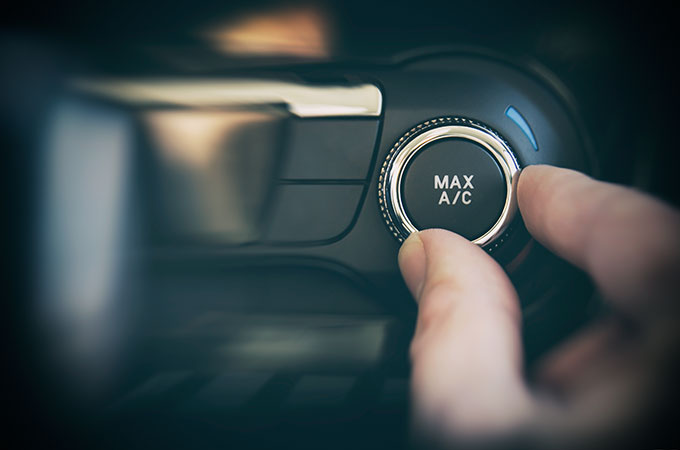The deeper you get into the summer months, the more critical your air conditioner becomes when keeping travel bearable. When working at its best, your A/C can keep the climate inside your vehicle nice and crisp while the air temperature goes through the roof. However, as with any vital piece of equipment in your vehicle, your A/C can begin to wear out over time, leaving you with a weak, less-than-cool airflow - or worse, no cold air at all!
You can avoid having to shovel out money to fix your A/C by keeping your eyes peeled for a few critical signs that things aren't chill with your car’s system.
Getting To Know Your A/C
There are few feelings quite like the intense burst of ice-cold air that comes out of your car’s vents when you hop in on a hot day and hit the A/C button. While you may enjoy the first-world privilege of vehicle climate control, do you know how it works?
The process of getting cold air into your vehicle isn’t as complicated as it may seem. With five simple pieces of equipment, your vehicle can provide much-needed cold air to every corner of the vehicle. Knowing a little about each element can help you troubleshoot repairs when the time comes for A/C maintenance or repair:
Compressor
The compressor is an essential part of your A/C. A functioning compressor will work hard to pressurize refrigerant in the A/C unit to cool the air brought in from the outside, as well as monitoring temperatures to know how low to chill the air. The compressor will also help to move air to the next part: the condenser.
Condenser
Located in front of your vehicle’s radiator, the condenser reduces the temperature of the air coming from the compressor to ensure that the air is the right temperature before pushing it along to the receiver.
Receiver/Dryer
Before the refrigerant reaches the compressor, it needs to turn from a liquid to a gas. The receiver/dryer element will ensure that no harmful liquids reach any parts of the A/C that can be damaged by the presence of fluid.
Thermal Expansion Valve
This valve works to monitor both the pressure and temperature of the air to ensure that the cooled air is the exact temperature you set on the dashboard or control panel.
Evaporator
The real magic-maker in the A/C system, the evaporator is responsible for mixing the refrigerant with the air flowing to the vent to ensure that you feel a nice, refreshing blast of air come from your A/C as soon as you hit the button.
4 Signs Your A/C Is Failing
Now that you know a bit more about your A/C system, you can begin to make a note of some of the most common signs that all is not well with your cooling system. When you start to wonder if your air conditioning is getting weak or failing, consider the following four signs:
1. Weak Flow Of Air
The more you use your A/C in your vehicle, the more familiar you will become with the strength and temperature of the various settings when selected. If you begin to notice a weaker flow of air or a higher temperature than usual, this can be a sure sign that your A/C needs some work or repair.
2. Noisy A/C Performance
Another sign to keep an ear out for is any noise associated with the A/C running that seems louder than average. Most modern vehicle A/C units are quiet other than the fans that push the air through the vents. If you notice a rattle, crunch, or grinding sound, you may need to look at your compressor or other elements to ensure that no parts have become loose or broken over time.
3. Strange Smells
A typical first sign of air conditioner failure is a strange or unexpected smell emanating from the vents while running. This symptom can come from a variety of problems, including a blocked and dirty air filter. Any unusual smell should alert you to take your vehicle into the shop for a quick inspection to ensure all is well.
4. Unexpected Water Appearing Inside Vehicle
While many vehicles will have a small pool of water appear underneath the vehicle after running the A/C, water should never appear within the cabin of the car. If you being to notice water pooling in any spot of your vehicle while running the air conditioner, seek professional guidance immediately. This may be a sign of blocked drains that is keeping water from draining to the ground.
Protect Your A/C With Healthy Habits
Once you know the signs that your A/C needs some TLC, you can better watch for problems and remedy them before becoming more prominent and costly problems.
If you notice something unusual with your A/C, avoid DIY repairs. Air conditioning is a complex and technical science, and should only be inspected and repaired by a trained professional. A rule of thumb: if you wouldn’t bust open your home A/C unit, don’t try to fix your vehicle’s!
Many problems that arise with the A/C are caused by poor habits when driving. To keep your A/C healthy and thriving, always start your trip in the lowest setting. Avoid throwing the temperature switch to the highest level, despite how hot it currently is outside. These behaviors can put undue wear and tear on your system, causing it to wear out quickly.
Also, keep your car’s air filters clean to help the airflow. Never allow your car to “pre-cool” by sitting in park before driving, as A/C is made to work best while being powered by the engine.
If you keep a keen eye on your A/C and follow simple steps to ensure that your unit is well maintained, you can drive in comfort, knowing that cold air will always help you — no matter the season!










